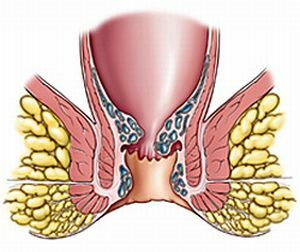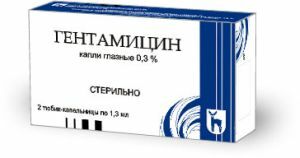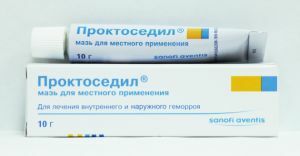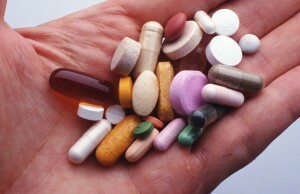 People who have had to deal with hemorrhoids know how unpleasant the disease is. It significantly worsens the quality of life, giving discomfort, discomfort and pain.
People who have had to deal with hemorrhoids know how unpleasant the disease is. It significantly worsens the quality of life, giving discomfort, discomfort and pain.
Because of the sensitivity of the problem, many patients postpone their trip to the doctor. They are engaged in self-medication, using drugs bought in the pharmacy and folk remedies.
Although hemorrhoids most often do not pose a threat to life, if the disease is triggered, it can lead to disastrous consequences, including the appearance of inflammation, suppuration and sepsis.
The role of antibiotics in the treatment of hemorrhoids
Hemorrhoids are accompanied by unpleasant symptoms, hemorrhoids are enlarged, the mucous membrane is damaged and ulcers appear on it. These are excellent conditions for the propagation of harmful bacteria that aggravate the inflammatory process and the patient's condition.
If an infection has joined the disease, the doctor must prescribe antibiotics. These drugs prevent the spread of infection and contribute to the death of harmful microorganisms.
The course of antibiotics is necessarily prescribed in such cases:
- with suppuration;
- for necrosis of the hemorrhoidal node.
If the focus of the infection is not immediately eliminated, it will not only intensify the inflammatory process, but lead to the appearance of suppuration. 
A purulent process located in the rectum is difficult to tolerate by a person, as it is accompanied by pains that increase during defecation. In addition, there is an increase in hemorrhoids.
The danger of suppuration is that the risk of fistula or sepsis increases. These phenomena are life threatening.
In the event of sepsis, which is accompanied by an increase in temperature to 40 ° C, immediate surgical intervention with the participation not only of the surgeon but also of other specialists is required.
Prescribing antibiotics after surgery
After surgery, the risk of suppuration and other complications increases. Infection with a wound is often observed.
The operated site is constantly in contact with fecal masses, which increases the risk of inflammation.
To prevent infection with infection, the doctor prescribes a course of antibiotics, which usually lasts no more than 5 days, but in rare cases can reach 2 weeks. The drugs help to stop the inflammatory process, and also remove some unpleasant symptoms.
What drugs do proctologists use?
Antibiotics for hemorrhoids can be prescribed only by a doctor. Depending on the situation, antibacterial drugs are prescribed in the form:
- injection;
- ointments;
- tablets;
- suppository.
In cases of severe inflammation, suppuration or a threat to life, injections are given intramuscularly or intravenously.
But more often, antibiotics of local action( ointments or suppositories) are used because they have high efficiency. They not only prevent the reproduction of bacteria, but also relieve pain, itching, burning, improve blood circulation.
Most popular tools:
- Gentamicin .The drug is prescribed for complications of chronic hemorrhoids. A broad-spectrum antibiotic prevents
 or eliminates purulent wounds. Can be prescribed in the form of injections( in severe cases) or in the form of ointments. Usually the course of treatment with the drug is ten days. Dose appoints a doctor individually, depending on the complexity of the disease and the characteristics of the patient.
or eliminates purulent wounds. Can be prescribed in the form of injections( in severe cases) or in the form of ointments. Usually the course of treatment with the drug is ten days. Dose appoints a doctor individually, depending on the complexity of the disease and the characteristics of the patient. - Detralex .The medication in tablets has a venotonic property, therefore it improves the venous circulation. Thanks to improved blood circulation, hemorrhoidal nodes decrease, and with prolonged admission, complete disappearance. The peculiarity of the drug is that it has practically no restrictions on the duration of administration. Regular intake reduces the risk of exacerbations in chronic hemorrhoids.
- Levomycetin and Tetracycline possess excellent antibacterial properties, therefore these tablets are often prescribed for hemorrhoids. They help reduce the inflammatory process. It is usually necessary to take the pill 3-4 times a day for a week, but sometimes the course of treatment can be increased or decreased.
- Levomekol .The antibiotic of a wide spectrum of actions perfectly copes with elimination of infection of a wound and suppresses inflammatory process in short terms. The drug is available as an ointment and is used topically. In the postoperative period, this ointment is indispensable, since it contains two components: an antibiotic and a substance that accelerates the healing of wounds. The antibiotic removes inflammation and destroys microbes, and methyluracil accelerates wound healing, and also acts as an excellent immunostimulant.

- Proctosedil is available in various pharmacological forms: in the form of suppositories and as an ointment. It contains an antibiotic, Framicetin, which has a wide range of actions. Taking medication prevents infection of the intestine, and also relieves pain symptoms. Since the drug begins to act within a few minutes after admission, it is prescribed for acute illness and exacerbations, which are accompanied by severe pain. The drug reduces itching and has an anti-allergenic effect.
- Gepatrombin G is available in the form of ointments and suppositories. The course of treatment with the drug should not exceed two weeks. With a strong exacerbation, the maximum dose is prescribed. The drug has excellent anti-inflammatory and antimicrobial effects, as well as stop unpleasant symptoms. The effectiveness of the agent is due to three main components: the drug has an anti-inflammatory effect, removes puffiness and prevents the formation of blood clots, has an anti-inflammatory effect and reduces itching, and has an analgesic effect.
Possible complications and problems
 Taking antibiotics is of great help in treating acute or chronic hemorrhoids.
Taking antibiotics is of great help in treating acute or chronic hemorrhoids.
But the course of treatment with these drugs can have its own complications, which are manifested in the form of dysbiosis, diarrhea and other related diseases.
In connection with these doctors often appoints along with antibacterial drugs a course of prebiotics and probiotics. They help to restore the intestinal microflora, eliminate diarrhea and normalize the work of the gastrointestinal tract.
Taking antibiotics helps to reduce the inflammatory process and prevent infection of the intestine. When infection occurs, as well as after surgery, antibiotic medicines are part of the compulsory treatment, as they reduce the risk of developing serious complications( infection of the wound, bleeding, fistula formation).
And although hemorrhoids do not belong to life-threatening diseases, some of its complications, for example, sepsis, can pose a threat to a person.
In some cases, taking antibiotics is necessary to eliminate or prevent serious complications. But should be prescribed only by a doctor, taking into account the course of the disease, patient characteristics and other factors. Self-medication only aggravates the patient's condition.
